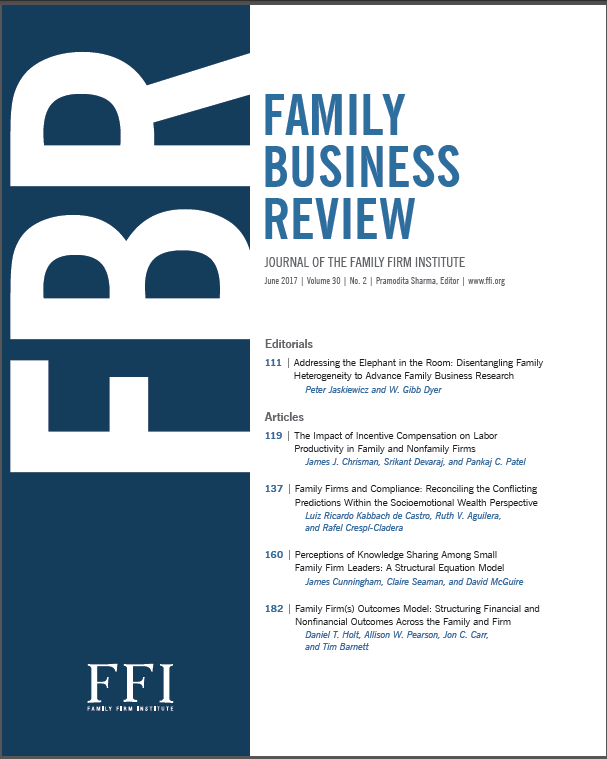History-Informed Family Business Research: An Editorial on the Promise of History and Memory Work
IF 5.6
1区 管理学
Q1 BUSINESS
引用次数: 2
Abstract
Families are constituted by shared memories and a common history. Research shows that talk about the past constitutes between 25% and 33% of the dinner conversation around the family table (Beals & Snow, 2002; Blum-Kulka, 1993, 1994; Perlman, 1984). Much of this conversation involves sharing experiences of the recent (i.e., “what did you do today?”) or distant past (i.e., “remember our vacation to Niagara Falls?”). More critical to the family constitution, however, are those conversations in which family members recount events outside the lived experience of any of the individuals at the table. These vicarious memories are the foundational elements of collective memory. Shared vicarious memories define the family as a distinct social entity with coherence and continuity over time and space (Pratt & Fiese, 2004). Family business researchers are only beginning to appreciate the theoretical and empirical value of viewing the family business through the lens of family memory and history. We gain considerable insight into the nature and constitution of family businesses by systematically analyzing what, and how, families remember and forget. The collection of papers that comprise this special issue on History-Informed Family Business Research is premised on this assumption. From these articles, we see a broad range of historical methodologies applied to a diverse array of family businesses. We also see how intractable issues that have troubled family business research over the years achieve a new clarity when viewed through the lens of the past and how it is remembered. The intent of this essay is to elaborate on the value of history-informed family business research and demonstrate how it can address persistently thorny issues in our discipline. We organize the essay into three sections, drawing on the studies in this special issue to illustrate points in each section. In the first section, we demonstrate how adopting a historical perspective can help us address the recurring definitional question, what is a family business? Our answer rests on the recursive relationship between historical memory as a practice and the family as a social entity. Like all social entities, families are a product of, and shaped by, their history. However, as active authors of their history, families have a higher degree of agency over how their history is told. It is the dynamic interaction of family practices of remembering and how remembering shapes the sense of family that defines a family business. Defining family businesses as a process of historical reconstruction rather than as a set of static properties (e.g., Chrisman et al., 2012) offers a different ontological perspective that defines a family business by how its members reconstruct family boundaries in ongoing acts of remembering. We elaborate on this recursive dynamic between the past and the family’s construction of the present and future in the first section. In the second section, we show how history and memory can help us address the recurring question of how family businesses balance the demands of being a business, on one hand, and the demands of being a family, on the other. To answer this question, we focus on the processes by which informal memories become 1157491 FBRXXX10.1177/08944865231157491Family Business ReviewSuddaby et al. research-article2023历史背景下的家族企业研究:历史与记忆工作前景评论
家庭是由共同的记忆和共同的历史组成的。研究表明,在家庭餐桌旁的晚餐对话中,谈论过去的话题占25%至33%(Beals&Snow,2002;Blum-Kulka,19931994;Perlman,1984)。这段对话的大部分内容涉及分享最近的经历(即“你今天做了什么?”)或遥远的过去(即“还记得我们去尼亚加拉瀑布度假吗?”)。然而,对家庭构成更关键的是那些家庭成员讲述餐桌上任何人生活经历之外的事件的对话。这些替代记忆是集体记忆的基本要素。共同的替代记忆将家庭定义为一个独特的社会实体,在时间和空间上具有连贯性和连续性(Pratt&Fiese,2004)。家族企业研究者才刚刚开始意识到从家族记忆和历史的角度看待家族企业的理论和经验价值。通过系统地分析家庭记忆和遗忘的内容以及方式,我们对家族企业的性质和构成有了相当深入的了解。本期《历史知情家族企业研究》特刊的论文集就是以这一假设为前提的。从这些文章中,我们看到了广泛的历史方法论应用于各种各样的家族企业。我们还看到,多年来困扰家族企业研究的棘手问题是如何从过去的角度来看的,以及人们是如何记住它的。本文旨在阐述基于历史的家族企业研究的价值,并展示它如何解决我们学科中持续存在的棘手问题。我们将这篇文章分为三个部分,利用这期特刊中的研究来说明每个部分的要点。在第一节中,我们展示了采用历史视角如何帮助我们解决反复出现的定义问题,什么是家族企业?我们的答案建立在作为实践的历史记忆和作为社会实体的家庭之间的递归关系上。像所有社会实体一样,家庭是其历史的产物,并由其历史塑造。然而,作为他们历史的积极作者,家庭对如何讲述他们的历史有更高程度的代理权。正是家族记忆实践的动态互动,以及记忆如何塑造家族感,才定义了家族企业。将家族企业定义为一个历史重建过程,而不是一组静态属性(例如,Chrisman et al.,2012)提供了一个不同的本体论视角,通过其成员如何在持续的记忆行为中重建家族边界来定义家族企业。在第一节中,我们详细阐述了过去与家庭对现在和未来的构建之间的这种递归动态。在第二节中,我们展示了历史和记忆如何帮助我们解决一个反复出现的问题,即家族企业如何平衡作为企业的需求和作为家庭的需求。为了回答这个问题,我们关注非正式记忆成为1157491 FBRXXXXX10.1177/08944865231157491《家族企业评论》Suddaby et al.research-article2023
本文章由计算机程序翻译,如有差异,请以英文原文为准。
求助全文
约1分钟内获得全文
求助全文
来源期刊

Family Business Review
BUSINESS-
CiteScore
12.40
自引率
13.60%
发文量
13
期刊介绍:
Family Business Review (FBR) has been a refereed journal since 1988, serving as the premier scholarly publication dedicated to the study of family-controlled enterprises. It delves into the dynamics of these businesses, encompassing a range of sizes from small to very large. FBR concentrates not only on the entrepreneurial founding generation but also on family enterprises in subsequent generations, including some of the world's oldest companies. The journal also publishes interdisciplinary research covering families of wealth, family foundations, and offices.
 求助内容:
求助内容: 应助结果提醒方式:
应助结果提醒方式:


